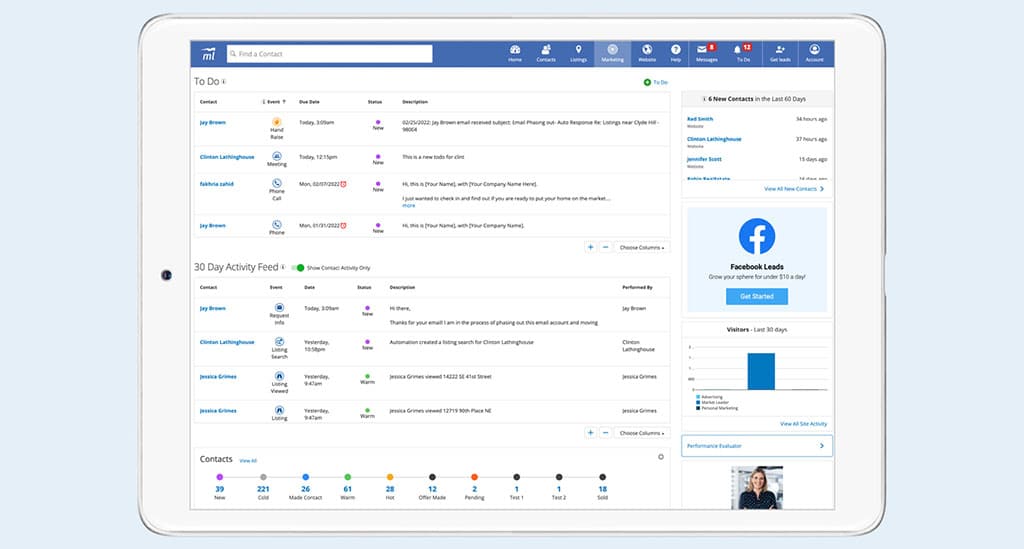Success in the real estate industry takes serious hustle and grit, no matter what the market is doing. It’s been rough out there lately, but don’t worry—I’ve got your back! I’ll share 11 awesome tips on how to make money as a real estate agent, even when things aren’t exactly booming. From making the most of tech to nurturing those all-important connections, these strategies will give you the tools to build a sustainable business. So, let’s dive in and get you on the path to success!
Key Takeaways
- There are many ways to learn how to make money with a real estate license, including tapping unlikely lead sources.
- Thinking outside the box can help build a multi-spoked real estate business by creating additional income streams in adjacent areas.
- Some real estate niches, like luxury and commercial, are naturally more lucrative than others.
- The best way to make money in real estate is to have great business and marketing plans to give yourself a roadmap toward monetary goals.
1. Leverage Your CRM to Keep Your Sphere Warm
Your sphere of influence is your secret weapon in real estate—and your customer relationship manager (CRM) is the key to unlocking its full potential. By setting up automated campaigns that keep you in touch with your contacts through emails and text messages, you’ll stay top of mind when they’re ready to make a move.
Here are a few ideas:
- Create a targeted email campaign to educate buyers on the benefits of home ownership.
- Write an email campaign that keeps your seller leads current on the latest market trends.
- Send holiday emails, including client birthdays, home purchase anniversaries, National Donut Day, etc., to keep you top of mind with your sphere of influence.
- Send automated quarterly emails to your sphere asking for referrals.
- Create videos to embed in your text messages and emails (try a platform like BombBomb) sharing interesting facts about your town.
- Send text messages to your past clients asking for 5-star reviews.
- Share local events with your database via text and email.
- Create an email newsletter for your database.
- Set up listing alerts for your buyer leads to go out automatically when a new home that matches their criteria hits the market.

With so many great CRM options tailored specifically for real estate agents, you’re sure to find one that fits your needs and budget. Still trying to figure out where to start? Check out our article on the best real estate CRMs to find the perfect fit for your business. Trust me, investing in a solid CRM and putting it to work for you can make all the difference in keeping your pipeline full and your commissions flowing, no matter what the market’s doing.
2. Fill Your Pipeline With Paid Leads
When the market slows down, keeping your pipeline full is crucial—and paid real estate leads can be a game-changer. Whether you’re an individual agent, a team leader, or a broker, there are plenty of ways to keep those leads coming in.
Check out some of my favorite paid lead generation companies:
- Buyer leads: Zillow
- Homesellers: SmartZip
- Digital leads: Zurple
- Affordable leads: zBuyer
- Probate leads: Catalyze AI
These experts know how to target the right people with the right message at the right time, serving up hot leads ready to convert. However, not all paid leads are created equal. To make the most of your investment, be sure to:
- Do your homework and choose a well-reviewed lead generation company.
- Select a company that delivers quality leads that fit your target market.
- Experiment with different lead generation strategies to find what works best for you.
With the right approach and a little bit of hustle, investing in paid leads can be a smart way to keep your business thriving, even when the market’s not cooperating. So, don’t be afraid to explore your options and find the perfect match for your business.

Looking for a powerful CRM that can also generate exclusive leads? Get a predictable number of exclusive and affordable social media leads monthly with Market Leader.
3. Control Your Destiny by Hitting the Phones
In a slow market, it’s easy to feel like success is out of your hands. But one tried-and-true strategy puts you back in the driver’s seat—hitting the phones and cold calling. This tactic is a powerful way to learn how to make money as a real estate agent and land some listings, even when the market is challenging.
Now, I know what you’re thinking—cold calling isn’t exactly the most popular strategy these days. And it’s true—it’s not for everyone. But hear me out! You’re taking control of your productivity and pipeline by reaching out to FSBOs, expireds, your farm, and other potential leads. And with some great cold-calling scripts in hand, your confidence will grow with each new call.

Here’s the thing: When you’re the one making the calls, you’re not waiting for leads to come to you. You’re actively seeking opportunities and starting conversations that can lead to real business. And while it may take some time to learn how to convert leads over the phone effectively, the payoff can be huge.
Of course, cold calling isn’t the easiest way to learn how to make money with a real estate license. It takes persistence, patience, and a willingness to step outside your comfort zone. But if you’re ready to put in the work and learn the skills, cold calling can be a compelling choice to keep your pipeline full and your business thriving, no matter what the market’s doing.
Get started with the right tools. If you’re ready to tackle this cold-calling strategy, REDX delivers fresh leads directly to your fingertips. You can choose which type of leads you want to work with and only pay for what you need. Plus, their built-in dialer saves your finger muscles from all the number-punching.
4. Find Future Buyers by Nurturing Renters
When the market slows down and buyer leads seem scarce, it’s time to get creative. One often-overlooked source of potential buyers? Renters! Targeting renters is a smart strategy when learning how to make money as a real estate salesperson, even when the market is challenging. The people signing leases could be your next big sale. By marketing directly to renters and nurturing their relationships, you can groom them to become your future buyer clients.
Think about it: Renters may not be ready to buy right now, but by staying in touch and providing valuable information about the homebuying process, you’ll be the one they think of when they are ready to take that next step.

So how do you tap into this potential gold mine of leads? Here are a few ideas:
- Offer free resources, like a “Renter’s Guide to Buying a Home” or a “How Much Home Can I Afford?” calculator.
- Host informational seminars or webinars specifically geared toward renters (partner with a lender to get those questions answered).
- Partner with local apartment complexes to provide referral incentives.
- Use targeted social media ads to reach potential renters in your area.
Pro Tip
Focusing on renters and building relationships over time will cultivate a pipeline of potential buyer leads without breaking the bank on paid leads. This well-tested method can pay off big when those renters are ready to become homeowners.
5. Build Relationships With Developers
When the market starts to cool and traditional sources of business start to dry up, building relationships with real estate developers and investors can be a lifeline. Here’s the thing: While the average buyer may be tightening their purse strings in a slow market, investors tend to do the opposite. They know that the secret to building real estate wealth is to buy when everyone else is sitting on the sidelines—and they typically have the means or know some hard money lenders to do it.

As Warren Buffett famously said, “Be fearful when others are greedy, and greedy when others are fearful.” When the market is retreating, and everyone else is watching their pennies, that’s when savvy investors are ready to pounce.
So, how can you find real estate investors and tap into this revenue source? It all starts with building relationships. Here are a few ideas:
- Attend local real estate investor meetups and networking events.
- Join online forums and social media groups geared toward developers and investors.
- Offer specialized services, like property management or renovation consulting.
- Provide valuable market insights and data to help investors make informed decisions.
Of course, working with investors isn’t always easy. They can be demanding and may have different priorities than traditional buyers. But if you’re willing to do the work and build those relationships over time, you may just find that investors are the key to keeping your pipeline full and your business growing—and a dynamic way to learn how to make money as a real estate agent.
Need to learn the inside scoop on hard money lenders to share with your investor clients? Check out Kiavi. From bridge loans to fix-and-flip funding, Kiavi uses state-of-the-art tech to streamline the process and make funding easier for investors.
6. Choose a Lucrative Niche
When learning how to make money in real estate, there are plenty of opportunities across all types of properties and markets. But if you’re looking to maximize your earning potential, a few specific areas tend to be more lucrative than others.
Commercial Real Estate
One of the most profitable areas of real estate is commercial property. This niche includes everything from office buildings and retail spaces to warehouses and industrial properties. Commercial real estate deals are larger and more complex than residential transactions, often with higher commissions and fees. Commercial properties often have longer lease terms and more stable tenants, which can provide a steady income stream over time.
However, breaking into the commercial real estate market can be challenging, especially for agents who are used to working with residential clients. In most cases, you’ll need to obtain additional designations, such as the Certified Commercial Investment Member (CCIM) designation, to show your expertise and credibility in the commercial space.
Luxury Real Estate
If commercial real estate isn’t your cup of tea, luxury real estate is another highly profitable area to consider. This market focuses on high-end properties and affluent clients, which can translate to significant commissions and fees. Unlike commercial real estate, you don’t necessarily need additional licenses or designations to break into the luxury market—although pursuing certifications like the Luxury Homes Certification can help establish your credibility and expertise.
One of the biggest advantages of working in the luxury real estate market is that the skills and strategies you’ve developed in residential real estate are highly transferable. You’ll still need to focus on building relationships, providing exceptional client service, and staying up to date on market trends and best practices, but you won’t need to start from scratch regarding your knowledge and experience.
If you’re interested in making the transition from residential to luxury real estate, there are a few key steps you can take to set yourself up for success:
- Educate yourself on the luxury market and the unique needs and preferences of high-end clients.
- Build a strong personal brand and online presence that showcases your expertise and value proposition.
- Network with other luxury agents, brokers, and industry professionals to expand your reach and referral opportunities.
- Develop a targeted marketing strategy that speaks directly to the needs and desires of luxury buyers and sellers.
- Provide exceptional, white-glove service that goes above and beyond what clients expect.
For more detailed guidance on becoming a luxury real estate agent, check out our guide that walks you through the process step-by-step.
And if you’re really ready to level up your real estate business, explore the gorg website designs of Luxury Presence. If you’re competing with other luxury real estate pros, you’ll need a site that can keep up. Your image is important in the luxury game, and you’ll need high-end branding. Luxury Presence is an all-in-one platform that manages your online presence with stunning websites that generate leads to help you get your sophisticated brand out in front of all the right eyeballs.
Ultimately, the type of real estate that makes the most money will depend on your unique skills, interests, and market opportunities. Whether you specialize in commercial, luxury, or another niche market, the key is continuously educating yourself, building your network, and providing exceptional value to your clients. With the right strategy and mindset, you can build a highly profitable and rewarding career in any area of real estate.
7. Identify an Underserved Niche
When the competition is fierce and the market is slow, it’s time to get specific. One of the smartest strategies for standing out and generating leads is identifying an underserved real estate niche in your market and becoming the go-to expert in that area. If you want to know how to make money in real estate agent niches, this is how to do it.
Now, you might be thinking—won’t narrowing my focus limit my potential business? But the truth is, the smaller your niche, the more targeted (and effective) your marketing efforts can be. By honing in on a specific group of buyers or sellers, you can tailor your messaging, build deeper relationships, and establish yourself as the authority in that space.

So, what are some potential real estate niches to explore? Here are just a few examples:
- Probate
- REO (Real estate owned)
- Military relocation specialist
- Vacant land
- Agricultural
- Divorce and probate
- Senior living
- Investors
Keep in mind that not every niche will be a fit for every market. While military housing might be an ample opportunity in some areas, it may not be relevant in others. And beachfront condos might be a hot commodity in coastal towns, but they’re probably not a factor in inland cities.
The key is to identify a niche that aligns with your market and expertise and then go all-in on becoming the best in that space. Focus all your marketing efforts around that niche, from your website and social media presence to your networking and referral strategies. By doing so, you’ll be well on your way to answering questions about how to make money as a realtor.
And don’t be afraid to get ultra-specific. For example, instead of focusing on “farmhouses,” you might specialize in “horse farms or equestrian facilities from 5 to 25 acres.” The more targeted your niche, the easier it will be to establish yourself as the go-to resource for that group.
8. Become the Expert Other Agents Turn To
One real estate side hustle that offers multiple benefits is becoming the agent other agents turn to for advice and expertise. By positioning yourself as a leader and educator in your industry, you’ll attract more buyers and sellers and create opportunities to monetize your knowledge.
Here’s how:
- Start by centering your marketing efforts on teaching other agents how to build their businesses.
- Share your insights, strategies, and best practices through blog posts, social media content, and online courses.
- Create digital tools and resources that other agents find valuable, like checklists, templates, and downloadable guides.
- Capture the email addresses of agents who download your tools so you can continue to market to them.
- If you have design skills, consider creating digital products to sell online (think Etsy).
- Look into becoming a faculty member with your state association to teach agents CE credit courses to maintain their licenses.
- Share your knowledge on a larger platform by becoming a freelance writer for real estate publications like RealTacticsPro.com or realtor.com.
By monetizing your expertise in this way, you can create a lucrative side hustle that complements your core real estate business.

Becoming a real estate expert other agents turn to takes time, effort, and consistency to build your reputation and establish yourself as a thought leader. But the payoff can be huge—not just in generating leads and closing deals but also in creating additional revenue streams that can help you ride out any market.
9. Manage Properties That Don’t Sell
As a real estate agent, you’ve probably encountered this scenario before: You’ve listed a property for a client, but due to circumstances beyond their control (like a military relocation), they must move before the home sells. While this can be frustrating for everyone involved, it also presents a unique opportunity for you to expand your services and generate additional revenue.
One smart strategy is to offer to manage the property for your client as a rental. By taking on the role of property manager, you can help your client avoid the stress and hassle of dealing with tenants and maintenance issues from afar—all while creating a new income stream for your business.
Of course, before you start offering property management services, there are a few key things to remember. Check with your broker to ensure that your brokerage is set up to manage properties and that you follow all in-house rules and regulations. In some states (like Florida), you may need a broker’s license to manage rental properties for others legally, so be sure to do your due diligence and comply with all relevant laws and regulations.

Assuming you’re able to move forward with property management, there are a few best practices to keep in mind:
- Communicate clearly with your client about your fees, services, and expectations.
- Screen tenants carefully to ensure a good fit and minimize turnover.
- Stay on top of maintenance and repair issues to keep the property in top condition.
- Keep detailed records of all income and expenses for tax purposes.
By offering property management services, you can provide a valuable solution for clients whose homes don’t sell right away—and create a lucrative new revenue stream for your business in the process. And who knows? You may even discover a passion for property management, leading to a new career path.
10. Create a Solid Business Plan
One of the biggest mistakes new agents make is assuming that simply having an active real estate license is enough to start raking in the dough. In reality, success in real estate requires a clear plan and a strategic approach. That’s where a clearly defined business plan and marketing plan come in.
Your business plan should outline your goals, target market, unique value proposition, and financial projections. It should also include a detailed budget for marketing, technology, and continuing education expenses. By treating your real estate career like a business from day one, you’ll be better equipped to make smart decisions and invest in the right tools and resources to help you grow.
Your marketing plan, on the other hand, should focus on how you’ll attract and retain clients. This plan might include tactics like:
- Building a strong online presence through a professional website and social media profiles.
- Networking with other local businesses and community organizations.
- Developing a niche or specialty to differentiate yourself from competitors.
- Creating valuable content (like blog posts or videos) to establish yourself as a thought leader.
- Leveraging email marketing and other outreach strategies to stay top-of-mind with past and potential clients.
By creating a comprehensive marketing plan and executing it consistently, you’ll be able to generate a steady stream of leads and build a reputation as a go-to agent in your market.
So, how do you make money as a real estate agent? It certainly takes effort and strategic planning. But for those willing to treat their real estate career like a business and work to build a strong foundation, the rewards can be life-changing.
11. Manage Expectations Based on Your Specific Market
Many agents set a goal of making six figures, but the path to achieving it can look different for everyone. There’s no one-size-fits-all formula on how to make money as a real estate agent—instead, it’s about understanding your market, setting clear goals, and consistently taking action to move the needle forward.
One of the first things to consider when aiming for a six-figure income is your market and niche. Real estate agent salaries vary from one market to another. In some areas, selling a single multi-million-dollar property could be enough to generate a six-figure commission. In others, you may need to sell a dozen or more homes at a lower price to achieve the same goal. Understanding your market and the types of properties and clients you want to work with is key to creating a realistic and achievable plan for success.
Set Concrete Goals
Once you clearly understand your market and niche, it’s time to set some concrete goals. This phase is where reverse engineering comes in. Start with your ultimate goal (e.g., making six figures in a year) and work backward to determine what you need to do each month, week, and day to get there. For example, if you know you need to sell 12 homes at an average price of $300,000 to make six figures, you can break that down into monthly, weekly, and daily targets for prospecting, setting appointments, and closings.
Learn to Convert Leads
But setting goals is only part of the equation—you also need the skills and strategies to achieve them. One of the most important skills for any real estate agent is the ability to convert leads into clients. This ability means mastering the art of asking leading questions, handling objections, and turning “no’s” into “yeses.” Any time you invest in learning and practicing these skills is time well-spent, as it can directly impact your ability to generate more business and close more deals.
In addition to lead conversion skills, there are a few other real estate agent tips that can help you achieve a six-figure income as a real estate agent:
- Build a strong personal brand and online presence to attract more leads and referrals.
- Focus on providing exceptional client service to generate repeat and referral business.
- Continually invest in your education and professional development to stay ahead of market trends and best practices.
- Leverage technology and automation to streamline your business and free up more time for revenue-generating activities.
- Surround yourself with a supportive network of colleagues, mentors, and industry experts who can provide guidance and accountability.
Ultimately, making a six-figure gross commission income (GCI) as a real estate agent is about setting clear goals, developing the skills and strategies to achieve them, and consistently taking action toward your vision. It’s not easy—but with hard work, persistence, and a willingness to continuously learn and adapt, it’s an achievable goal for any agent committed to success in the industry.
FAQs
Is it hard to make money as a real estate agent?
Let’s be honest—starting a career as a real estate agent is a lot like starting your own business. It takes hard work, dedication, and a willingness to put in the time and effort to build your brand and client base. So, how do you make money as a realtor? For those who treat their real estate career like a true business venture, the rewards can be significant—both financially and personally.
Is being a real estate agent a good side hustle?
This question is tricky to answer. Success working as a part-time real estate agent depends on various factors, including your current work situation, goals, and commitment to building a successful real estate business. There are pros and cons to being a real estate agent, especially part-time.
On the one hand, pursuing real estate as a side hustle while working a full-time job can be incredibly challenging. Real estate is a demanding field that requires significant time, energy, and resources—especially when working with clients. So, you’ll want to carefully consider whether working part time in real estate will work for you.
Your Take
How to make money as a real estate agent is a big question. Many roads lead to a lucrative real estate business. This list is just the tip of the iceberg. The trick is there is no trick—you can achieve as much success as you’re willing to work for. The beautiful thing about real estate is you can make it into anything you want. Whether you want to become a coach, a real estate investor, a template designer, or the most successful luxury agent in your market, the world is your oyster. But first, be sure to set clear goals so you’ll have a roadmap to get where you want to go.
Do you have a cool real estate money-making secret? How are you designing your real estate empire? I’d love to hear about it in the comments!






